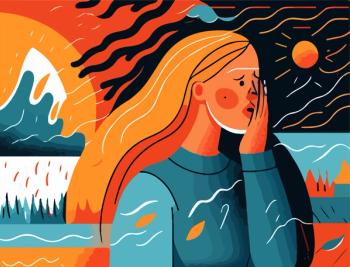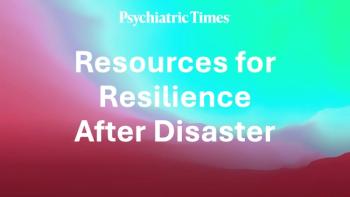
- Psychiatric Times Vol 35, Issue 10
- Volume 35
- Issue 10
Climate Change and Its Impacts on Mental Health
Climate change poses one of the greatest threats to public health in modern times, and the mental health effects are no less concerning.
Editor’s Note: One of the most important issues of our time regarding human health and mental health is the impact of climate change. This situation is, of course, not about a new impending ice age but is clearly about global warming. This matter has been discussed mainly in the political arena, and there, mainly as a political football/hot potato (no pun intended). Unfortunately, there has been little in the general medical or psychiatric literature discussing this critically important topic.
The article that follows is from David Pollack, MD, a nationally known community-focused psychiatrist, and we publish it here with an aim to focus primarily on the mental health implications of climate change. This initial article will be followed by a series of columns on climate change in the coming months.
Allan Tasman, MD, Editor in Chief
The reality of climate change is undeniable, catastrophic, and immediate. Its impact is already being felt throughout the world. Climate change is propelled along an inexorable course, creating ever-worsening environmental conditions destined to be with us long into the future. The degree of peril we and most other forms of life on this planet face is particularly linked to two unsustainable and unsupportable human derived factors: air pollution from the extraction and consumption of fossil fuels and large-scale animal agriculture.
How long have we known and how long do we have? Scientists and policy experts have known about the risks of excessive carbon in the atmosphere for decades, yet our leaders have failed to do anything significant to adequately address this unmitigated global slow-moving disaster.1
Climate and health connections
Climate change poses one of the greatest threats to public health in modern times.2 Assuming we don’t get annihilated by a meteor or extinguished by a nuclear winter from nuclear war, we will contend with the multiple and complex effects of climate disruption long beyond the time we successfully achieve the targeted reductions in global temperature. The effects of increasing global temperatures, rising sea level, excessive CO2 levels, droughts, and other extreme weather events, reflected most recently by the spate of historic hurricanes, cyclones, and wildfires, combine to threaten the health, well-being, and economic stability of individuals, communities, and nations worldwide. If we are concerned about well-being and burnout in the health sector, we should be even more concerned about the risks to earth’s well-being and planetary burnout.
Further reading:
The health effects of climate change are vast and distressingly serious. They encompass the creation, exacerbation, and complication of conditions involving almost all organ systems of humans and most other biological fauna and flora. The mental health consequences are also vast, pervasive, and likely to last longer than most other impacts on health.3 They require attention, understanding, education, and commitment from all of psychiatry (and other health and mental health professionals) to effectively identify, treat, and prevent.
The Climate Psychiatry Alliance (CPA) and other concerned mental health professional organizations have been growing in number and influence. The CPA has identified a broad agenda for addressing issues involving climate change and mental health. These concerns fall into five categories, reflected by the acronym, CA2RE: Clinical, Administrative, Advocacy, Research, and Education, detailed in the following sections.
Clinical areas to more fully understand and treat
We need to understand the direct psychiatric impacts of air and water pollution, increased temperature, flooding, opportunistic and pandemic infections, nutritional deficiencies, stress, and other factors on persons with current psychiatric conditions. Recent studies indicate a significant increase in suicides related directly to temperature increases as well as long-term negative impacts on cognitive functioning from exposure to air pollution.4,5 Higher rates of individual and group violence have also been associated with increases in temperature.6
Persons taking various classes of medications, including most classes of psychiatric drugs, are at greater risk of dehydration, hyperthermia, and heat stroke at higher temperatures and require guidance and support to avoid illness or death.7 Childhood development is particularly threatened by the many toxic factors to which children are and will continue to be exposed. It has been suggested that those who fail to act effectively and promptly will be perceived as having perpetrated wholesale and generational child abuse.
Anxiety and trauma symptoms/syndromes arise from rapid and extreme changes in one’s environment.3 These include conditions variously described as psychoterratic syndromes, solastalgia, eco-anxiety, and ecological grief.8,9 Many clinicians are reporting that their patients are worried about the future with particular emphasis on the geophysical and political environments. We are seeing a myriad of social, cultural, health, and economic consequences of mass migration stimulated, in part, by global environmental disruption.10
Administrative actions
As psychiatrists and providers of care to persons with mental illness, we can advocate for and/or initiate the following:
1 Develop effective disaster preparedness plans and systems in all health care facilities, including residential and hospital settings in which persons with mental illnesses are housed.
2 Create greater psychiatric disaster response capacity in all communities and incorporate that capacity within the existing emergency response and public health disaster planning systems.
3 Develop and promote health system practices, guidelines, and incentives to reduce excessive carbon consumption and other environmentally harmful impacts, many of which are already being adopted and are having a major effect. This applies to individual practices (eg, My Green Doctor at
4 Reduce or eliminate unnecessary professional travel when telecommunication methods allow various meetings or conferences to be conducted with participants in dispersed locations. This includes telehealth consultation and treatment as well as administrative, planning, or educational meetings.
5 Participate in developing public health preparedness for the ongoing risks and consequences of climate change at the community level, including assisting communities to remain committed to mitigating, preventing, and reversing future climate impacts while simultaneously maintaining individual and community health, well-being, and cohesion-a process known as transformational resilience.11
6 Participate in the improvement and expansion of risk communication practices to incorporate understanding of the mental and emotional aspects required to effectively inform and motivate the public to act in timely and appropriate ways to various disaster scenarios.
Advocacy action
To mitigate the effects of climate changes, psychiatrists can work with political and policy leaders to disabuse and transcend the denial of science and to recognize the immediacy and urgency of climate disruption. They can participate in efforts to defund and disinvest in the fossil fuel industry. They can provide effective input into a wide range of policy initiatives to reduce and eliminate the primary causes of climate change, especially those that are relevant to maintaining and improving the public’s health. And they can promote the development and utilization of climate and health impact statements for any or all major governmental or private sector projects that require environmental impact analyses statements.
Research goals
To support and guide these efforts, research needs to be geared to fully understand the effects of climate change on mental health as well as how to address these impacts at the clinical and policy levels, including methods of improving resilience of individuals and communities. This includes efforts to better understand the the healing benefits of nature.
Education needs
As psychiatrists we have a duty to educate others about the impacts of climate change.12 Broad and evidence-based sets of curricula are essential for all health professional at the undergraduate, postgraduate, and continuing education levels. The public also needs to understand the connections between climate change and health. Data show that climate and health related arguments are the most potent and directly felt by all components of society and the most likely to motivate more positive action to reduce global temperatures and atmospheric carbon levels.13
Conclusion
Discussing these overwhelming and fearsome issues is far healthier than pretending that they do not exist or that it is too soon or too late to worry about them. Our children and future generations depend on us to act meaningfully and urgently to manage global warming and climate disruptions, the ultimate social determinants of health.
In the coming months, my colleagues and I will provide a series of reports on climate and mental health. These reports will contain more specific details on many of these topics, explanations that health care professionals can use with their patients and communities, and specific clinical guidelines for relevant conditions. We welcome your feedback, questions, and concerns, you can send an email to
Disclosures:
Dr Pollack is Professor Emeritus for Public Policy, Oregon Health and Science University, Portland, OR. He reports no conflicts of interest concerning the subject matter of this article.
References:
1. Rich N. Losing Earth: The Decade We Almost Stopped Climate Change. NY Times. August 2018.
2. Watts N, Adger WN, Agnolucci P, et al. Health and Climate Change: Policy Responses to Protect Public Health. Lancet. June 2015.
3. Clayton S, Manning CM, Krygsman K, Speiser M. Mental Health and Our Changing Climate: Impacts, Implications, and Guidance. Washington, DC: American Psychological Association; 2017.
4. Burke M, González F, Baylis P, et al, Higher temperatures increase suicide rates in the United States and Mexico. Nature Climate Change. 2018;8:723-729.
5. Xin Z, Xi , Xiaobo Z. The impact of exposure to air pollution on cognitive performance. PNAS. 2018;115:9193-9197.
6. Cane M, Burke M, Hsiang S. Temperature and violence. Nature Climate Change. 2014;4:234-235.
7. Martin-Latry K, Goumy MP, Latry P, et al., Psychotropic drugs use and risk of heat-related hospitalization. Eur Psychiatry. 2007;22:35-338.
8. Albrecht G, Sartore GM, Connor L, et al. Solastalgia: the distress caused by environmental change. Australas Psychiatry. 2007;15(Suppl 1):S95-98.
9. Cunsolo A, Ellis N. Ecological grief as a mental health response to climate change-related loss. Nature Climate Change. 2018;8:275-281.
10. Rigaud KK, de Sherbinin A, Jones B, et al. Groundswell: Preparing for Internal Climate Migration. Washington, DC: World Bank; 2018.
11. Doppelt B. Transformational Resilience: How Building Human Resilience to Climate Disruption Can Safeguard Society and Increase Wellbeing. New York: Greenleaf Publishing; 2016.
12. Coverdale J, Balon R, Beresin EV, et al. Climate change: a call to action for the psychiatric profession. Acad Psychiatry. 2018;42:317.
13. Hathaway J, Maibach E. Health implications of climate change: a review of the literature about the perception of the public and health professionals. Curr Environ Health Rep. 2018;5:197-204.
Articles in this issue
over 7 years ago
ADHD: A 24-Hour Disorderover 7 years ago
ADHD, Bipolar Disorder, or Borderline Personality Disorderover 7 years ago
ADHD Neuroimaging: What’s New?over 7 years ago
Memory’s Last Breath: Field Notes on My Dementiaover 7 years ago
Prescribing Substances of Abuse in Psychiatric Careover 7 years ago
Three New Studies in Major Depressionover 7 years ago
Psychocardiology, Part 2: Fixing the Broken Heartover 7 years ago
Calling in the ScriptNewsletter
Receive trusted psychiatric news, expert analysis, and clinical insights — subscribe today to support your practice and your patients.







